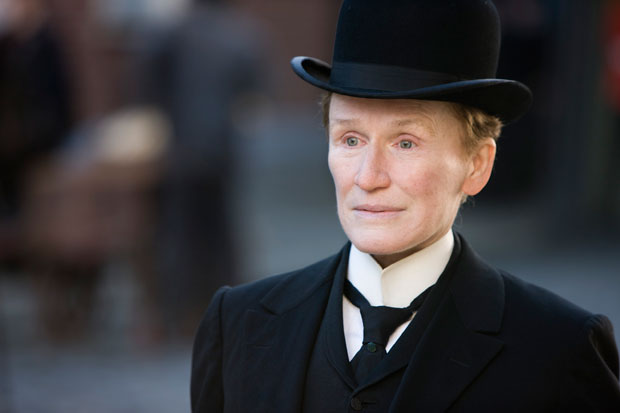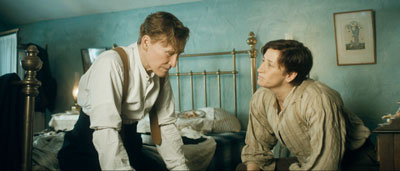Glenn Close’s Oscar-nominated role as a gender-bending Irish butler with a secret fuels the fascinating ‘Albert Nobbs’

HIDDEN LIFE | Glenn Close received her sixth Oscar nomination — alongside nominated co-star Janet McTeer, opposite — playing a gay woman living as a man in turn-of-the-century Ireland in ‘Albert Nobbs.’
Twenty-four hours before The Golden Globes ceremony, where she was in the running for best actress in a drama for Albert Nobbs, Glenn Close is doing some last minute press from her Four Seasons hotel room in Los Angeles. While she ultimately didn’t take home a statuette the next night, Close’s performance is a bona fide winner — and represents “closure and joy” for a passion-project 30 years in the making.
Playing a woman who for decades has camouflaged herself as a man to work as a hotel butler and survive in 19th century Ireland, Close, who also produced and co-wrote the film (and its Globes-nominated, Sinead O’Connor-performed original song, “Lay Your Head Down”), turns in a vulnerable, kindly, enigmatic and multilayered performance — quite literally so, with subtle facial prosthetics to butch up her features. Nobbs also co-stars Janet McTeer as Hubert, a swaggering lesbian whom also poses as a man, and Mia Wasikowska as Helen, a beguiling maid to whom Albert takes a romantic shine.
Albert represents a polar opposite of the role that has come to define Close in recent years: Iron-fisted, manipulative lawyer Patty Hewes on the DirectTV series, Damages, which wraps its fifth and final season this year.
Via telephone — before she learned of her Oscar nomination earlier this week — Close discussed gender-bending, wrapping up Damages, and a whole bunch of queer stuff.
— Lawrence Ferber
Albert Nobbs is now playing at the Angelika Film Center Mockingbird Station.
Dallas Voice: You first played Albert Nobbs in a 1982 off-Broadway production of the play and have toiled for years to bring a film version to screen. Do awards matter to you, both for this performance specifically and in general? Glenn Close: In what way? It sounds kind of disingenuous when I talk like this, but I honestly think that you’re almost a winner when you’re nominated and the whole craziness around who wins and doesn’t win I just can’t buy into. For the winner, yes, it’s wonderful, and it would be wonderful to win everything, particularly because this is the most I have been invested [in a film] and it was an incredible journey for me. But the journey itself had great closure and was challenging and satisfying in every way. So I don’t feel like awards would change that. Of course, I would love for a lot of people to see it. That’s where the nominations are very helpful.
 Were you a fan of movies about gender-bending characters, like Yentl and Victor Victoria, before Nobbs? Yeah. I remember seeing Yentl onstage with Tovah Feldshuh [in the 1970s]. It blew me away. But those were different from Nobbs. What was really important to us was to make the characters in the movie not seem oblivious for thinking this character is a man. I wasn’t convinced that Julie Andrews was a man, and I don’t think necessarily that Barbra Streisand was the most convincing of men. It was very important for us to be authentic and find ways of subtly changing Janet’s and my faces so that would be believable to the people within the story.
Were you a fan of movies about gender-bending characters, like Yentl and Victor Victoria, before Nobbs? Yeah. I remember seeing Yentl onstage with Tovah Feldshuh [in the 1970s]. It blew me away. But those were different from Nobbs. What was really important to us was to make the characters in the movie not seem oblivious for thinking this character is a man. I wasn’t convinced that Julie Andrews was a man, and I don’t think necessarily that Barbra Streisand was the most convincing of men. It was very important for us to be authentic and find ways of subtly changing Janet’s and my faces so that would be believable to the people within the story.
Did you and Janet have some fun with it when you were in your male drag? Yeah. Janet accosted Brendan Gleeson, whom she’d played opposite as Lady Churchill in the HBO series Into the Storm, and he didn’t have any idea who she was! I tell you, it would have been fun to get all duded-up and walk through Dublin. But I just didn’t have time to. I liked being Albert. I liked surprising myself every time I passed a mirror, and to be on the set looking like a guy is different from just acting.
The scene in which Janet’s character Hubert, whom Albert initially thinks is a biological man, catches her and realizes she’s a woman is so painful. Albert looks so scared. Was that a tough scene for you to act? No. I just had to think of how dire it would be for Albert if she was discovered and thrown out. She thinks her life is over and wouldn’t have a job. I think one of the hardest scenes for me was when I asked Helen out for a walk for the first time, because I didn’t know what to do with my face. Albert is starting to look up more than she ever had, but it’s still not comfortable for her to look into people’s eyes. The tricky thing about the whole part was the dilemma of somebody who has been stoic and behind a mask all those years — how much does she show on her face as she starts to look up and out at the world again?
Did you consider adding a new character, a young woman pretending to be a teenage boy, so you could cast Justin Bieber in it? Think of the box office dollars that would reap! [Laughing] Ah, Justin Bieber. He’d probably be very good at that. I don’t know if it would be convincing in a period movie in Victorian Dublin, but you never know!
While researching the time period in which Nobbs takes place, did you learn whether living as a male was typical for lesbians to do back then? My research mainly turned up women who did this either to fight in wars, have a job or go on adventure. And then there are cases of people who married women, and the women found out later [their husbands] were women and not men. So I don’t know. It was a mixture, and whether they were lesbians are not, homosexuality was against the law. I’m not sure whether lesbianism was also against the law, but it was certainly considered aberrant and something to hide.
You famously played lesbian military vet Margarethe Cammermeyer in the 1995 TV movie, Serving in Silence. When ‘don’t ask, don’t tell’ was repealed, was it a big moment for you? And did you two talk about it? Yes, it was, definitely. I was in touch with Grethe when that all happened and I would’ve loved to have gone to D.C. for that, but I just wasn’t able to. We talked about how proud we were that, back then, we did Serving in Silence and to think of the time that’s gone by since and the lives [military policy and DADT] affected in an unfortunate way. But thank God DADT doesn’t exist anymore. Not that everything’s going to change, but at least it has on the books. I think, ultimately, [gender and sexuality] shouldn’t matter. I’ve said this about our film. In some ways, gender should be irrelevant. It shouldn’t matter who someone is connected to and finds love and a life with. I hope [full federal equality] will come to be a reality for the LGBT world.
You’ve called Patty Hewes the role of your life. What can you tell us about this last season of Damages? Oh, it’s a good, juicy season. Patty goes after a Wikileaks guy, like Julian Assange. She’s prosecuting him and Helen is defending him, so it’s pretty good.
Does the season come to a conclusive, all-tied-up end, or does it leave things open so there could be a Damages movie later down the line, a la 24? I don’t know necessarily how our writers are going to end the season. We’ve had some general conversations about it, but knowing them I doubt it would all be in a tight and nice package with a bow.
If you were in a legal pickle, would you want Patty to represent you? Absolutely! We couldn’t afford her, but I’d like her to represent me, yes.
You lost Oscars in the past to two other gay favorites, Cher and Jodie Foster. Are you hatin’ on them? Funny, I didn’t think of that. I don’t hate them at all. Are you kidding me?
It would be great to see you three together in a project. Oh, that would be wild. That would be good.
………………….
•online exclusive
For a review of Albert Nobbs — and to read more about the Oscar nominations — visit DallasVoice.com
This article appeared in the Dallas Voice print edition January 27, 2012.













